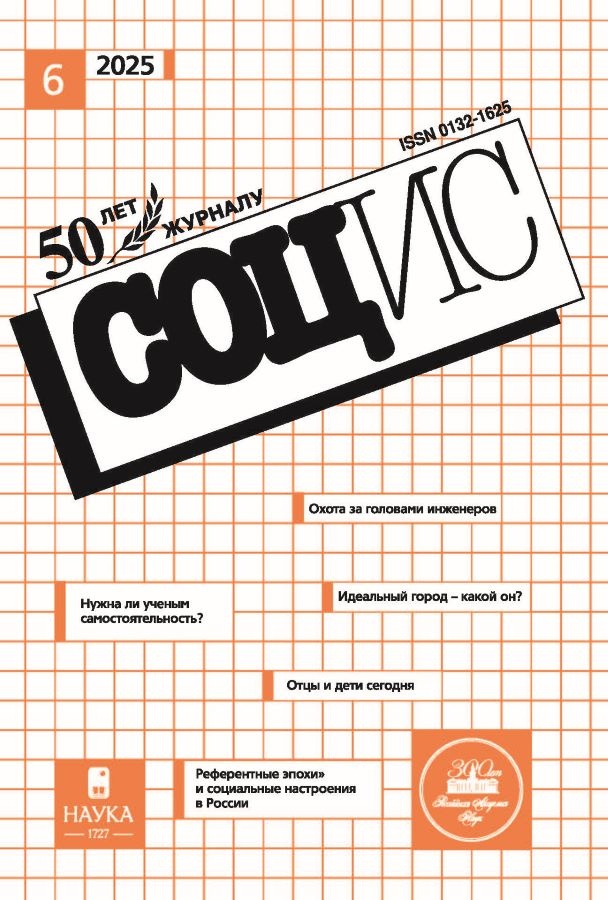Science fiction, preferences of russian readers, and the problem of constructing the future
- Авторлар: Podlesnaia M.A.1, Shevchenko O.K.2
-
Мекемелер:
- Institute of Sociology of FCTAS RAS
- V.I. Vernadsky Crimean Federal University
- Шығарылым: № 6 (2025)
- Беттер: 78-91
- Бөлім: CULTURAL SOCIOLOGY
- URL: https://cardiosomatics.ru/0132-1625/article/view/690155
- DOI: https://doi.org/10.31857/S0132162525060078
- ID: 690155
Дәйексөз келтіру
Аннотация
The article presents the results of an all-Russian online survey on Russians’ reading preferences in science fiction literature (N = 1244). The survey was supplemented by the researchers’ immersion in the studied environment through interactions with professional science fiction writers, participation in fan conventions, and engagement with fandom websites. The respondents’ preferences were compared with statistics from the authoritative resource «Laboratory of Science Fiction». The discussion of empirical data is preceded by a theoretical analysis of science fiction as a social phenomenon that fosters scientific, technical, and predictive thinking. The article also examines the evolution of Soviet and Russian science fiction in parallel with the social transformations that occurred in the USSR and the Russian Federation. The study aims to identify, based on empirical data, what lies within the reader’s “field of vision” as a result of their reading preferences and how these preferences may influence their worldview. In part, this is an attempt to discern the «sociotechnical imaginary» that literature helps sustain.
Толық мәтін
Авторлар туралы
Mariia Podlesnaia
Institute of Sociology of FCTAS RAS
Хат алмасуға жауапты Автор.
Email: yamap@yandex.ru
Cand. Sci. (Sociol.), Leading researcher, Center for the Study of Russian Regions of the Institute of Sociology
Ресей, MoscowOleg Shevchenko
V.I. Vernadsky Crimean Federal University
Email: skilur80@mail.ru
Dr. Sci. (Philos.), Head of the Department of Philosophy
Ресей, SimferopolӘдебиет тізімі
- Abramov R. N. (2023) Russian Science Fiction in the Genre of Alternativehistory as a Reflection of Mass Consciousness: a Sociological Dimension. Sotsiologicheskiye issledovaniya [Sociological Studies]. No. 4: 106–116. (In Russ.)
- Balatsky E. V. (2024.) The Phenomenon of Megacycles in Robert Heinlein’s Science Fiction. AlterEconomics. No. 21(1): 141–158. doi: 10.31063/AlterEconomics/2024.21-1.9. (In Russ.)
- Banerjee A. (2012) We Modern People: Science Fiction and the Making of Russian Modernity. Middletown, CT: Wesleyan University Press.
- Brandis E. P. (1955) Jules Verne and the Development of the Science Fiction Novel. Leningrad: VORPNZ RSFSR (Leningr. otd.). (In Russ.)
- Chernyakhovskaya Yu.S. (2022) The “Big Three” of Soviet Fiction. Moscow: In-t Naslediya. (In Russ.)
- Fishman L. G. (2008) Picture of the Future in Russian Science Fiction Writers. Lipetsk: Krot. (In Russ.)
- Howell Y. (2021) Apocalyptic Realism: Science Fiction by Arkady and Boris Strugatsky. Transl. from Eng. by E. Nesterova. Boston: Academic Studies Press; St. Petersburg: BiblioRossika. (In Russ.)
- Isaacson N. (2024) The Emergence of Chinese Science Fiction. St. Petersburg: Bibliorossika. (In Russ.)
- Latov Yu.V. (2023) Paradoxes of Russian “time travel” fiction. Sotsiologicheskiye issledovaniya [Sociological Studies]. No. 4: 117–128. doi: 10.31857/S013216250025451-9. (In Russ.)
- Orekhov A. M. (2021) For and Against Everyone. Critical Notes: On the Margins of Social and Humanitarian Knowledge. Korolev: Kosmos. (In Russ.)
- Rieder J. (2008) Colonialism and the Emergence of Science Fiction. Middletown, CT: Wesleyan University Press.
- Shevchenko O. K. (2024) Two Years of the SMO. Philosophical Diary of a Crimean. St. Petersburg: IS. (In Russ.)
- Zubov A. A. (2016) Science Fiction Studies and Genre Theory. Uchenye zapiski Kazanskogo un-ta [Scientific Notes of Kazan University]. No.158(1): 53–65. (In Russ.)
- Zubov A. A. (2018) “A Novel with a Scientific Lining”: Science Fiction and the Construction of Social Imagination in Russia at the Beginning of the 20th Century. Vestnik Moskovskogo un-ta. Ser. 9: Filologiya [Bulletin of Moscow University. Ser. 9: Philology]. No. 1: 116–126. (In Russ.)
Қосымша файлдар











